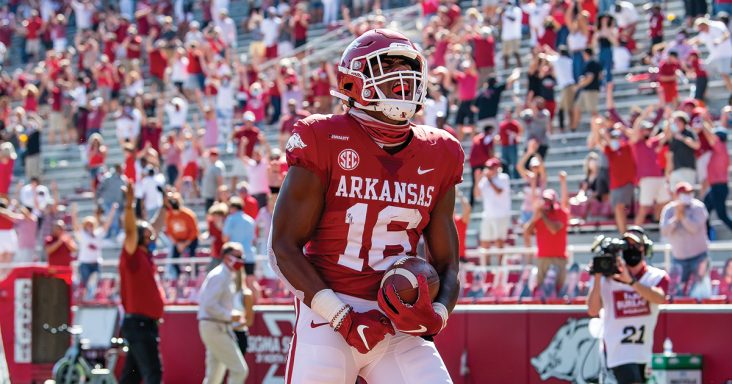With SEC assist, UA athletics has record profit in FY 2021
by February 22, 2022 7:56 am 2,460 views

University of Arkansas receiver Treylon Burks celebrates a touchdown before a sparse crowd inside Donald W. Reynolds Razorback Stadium during the 2020 football season. Arkansas’ athletics department saw a 121% drop in ticket sales revenue in FY 2021, down to $15.6 million. Limited venue capacities resulting from the COVID-19 pandemic were the primary source of that decrease.
The University of Arkansas athletic department reported a 7.3% revenue increase during the 2021 fiscal year and an overall department surplus of a record $20.8 million. A financial bailout from the Southeastern Conference (SEC) is primarily responsible.
According to the university’s revenue and expense report submitted in January to the NCAA, Fort Smith-based Landmark PLC’s annual audit shows the department’s total revenue to be $132.39 million for the fiscal year, up from $123.35 million the previous year. It also cut costs by about 10%, down to $111.59 million. The 12-month fiscal year started July 1, 2020, and ended June 30, 2021.
According to the UA athletics department website, dating to the 2009 fiscal year, the nearly $21 million profit margin is the largest in Razorback athletics history.
Thanks to the SEC, the athletics department achieved that surplus. The league gave its 14 member schools $23 million each to help offset the financial impact of COVID-19 on their athletic programs.
The league announced the supplemental revenue distribution in May 2021. It was a one-time advance based on projected revenue from a lucrative TV contract beginning in 2025 when ESPN receives the rights CBS currently holds to broadcast SEC football games.
“The extraordinary circumstances produced by the global pandemic have presented colleges and universities with an unprecedented disruption to their programs and budgets,” SEC Commissioner Greg Sankey said in a statement. “This supplemental revenue distribution will help ensure each SEC member will continue to provide high levels of support to its student-athletes.”
Each athletic department used the additional funds at their discretion and didn’t necessarily guarantee a year in the black. According to media reports, Auburn University reported a $9.7 million deficit on $123.54 million in revenue. LSU reported a $9.26 million deficit on $121.89 million in revenue.
Outside the SEC, published reports indicate Michigan finished FY 2021 with a $47.6 million deficit on $101.23 million in revenue, and Iowa had a $42 million debt on $74.8 million in revenue.
Arkansas reported a $500,000 deficit in FY 2020.
BY THE NUMBERS
Clayton Hamilton, the UA athletics department’s chief financial officer, said the department held most of the $23 million distribution from the SEC in reserves, anticipating there might be a lingering impact in FY 2022.
“For us, even going back to the summer of 2020, we approached it thinking it would be a multiyear impact,” he said.
Hamilton said the department reduced expenses last year in various ways to blunt the impact, including salary reductions, voluntary retirement programs and debt refinancing.
“It was a challenging [fiscal] year,” he said. “With the benefit of hindsight, looking back over the past two years, I am incredibly proud of how the athletic department managed the COVID impact.”

Arkansas saw a 121% drop in ticket sales revenue in FY 2021, down to $15.6 million. Limited venue capacities resulting from the pandemic were the primary source of that decrease.
By far the most significant revenue earner in ticket sales, football dropped 63%, from $26 million to $9.6 million. Basketball ticket sales were down 62%, but baseball ticket sales rose 163% to $3.08 million, eclipsing the $3 million mark for the first time. The NCAA canceled the spring sports season once the pandemic took hold in March 2020, but games and fans returned a year later.
The football program accounted for $52 million of the department’s total revenue or a little more than 39%. That’s down from $70.2 million the previous fiscal year. Men’s basketball brought in $14.9 million, down from $18.72 million.
The department’s third revenue sport, baseball, returned to play after being canceled in 2020 and increased revenue 67% to $5.74 million.
Other audit notes include:
The audit defined medical expenses as “input medical expenses and medical insurance premiums for student-athletes.” Not surprisingly, the athletics department’s medical expenses increased dramatically amid a global pandemic. Arkansas went from $1.61 million to $4.06 million during the 2021 fiscal year.
During the pandemic, college programs could not recruit athletes in person because of COVID. In part of that dead period, the fiscal year of 2021 occurred. Therefore, recruiting expenses fell from $1.94 million to $383,920.
Debt service expenses for UA athletics facilities dropped year-over-year from $16 million to $7.5 million. In September 2020, the UA System Board of Trustees approved a $19.1 million loan from Regions Bank to cover debt service due in 2020 and 2021 on bonds issued for UA athletic facilities. The UA will repay the loan in fiscal years 25 through 29.
Arkansas had less in expenses in guarantees, going from $4.90 million to $704,390. The guarantees include “input amounts paid to visiting participating institutions, including per diems and/or travel and meal expenses. This includes payments made due to game cancellations.” The Razorback football team incurred no guarantee expenses while playing an all-SEC schedule during the 2021 fiscal year. During the previous year, it paid $3.85 million in guarantees.
Contributions increased year-over-year from $17.9 million to $19.1 million. Football was the only program to increase, from $12.7 million to $13.3 million.
Hamilton, the UA’s athletics CFO since January 2010, underscored that the SEC payout was a one-time event and Arkansas’ athletics department remains self-supporting. Arkansas’ athletics department funds 19 teams — eight for men and 11 for women. It takes no student fees or taxpayer support.
“Any time we talk about a financial decision, we talk with that model in mind,” he said. “Maintaining that commitment to be a self-sustaining athletic program.”
